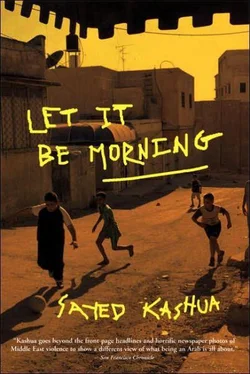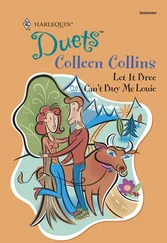My response has a mildly calming effect on them all, though I’ve allowed myself a deliberate overstatement. I explain that from now on, water will be used for nothing but drinking, and it should be for the children only. We’ll manage on fruit juice or carbonated drinks. “No more cooking with water,” I tell my mother. “And let’s not even think of tea or coffee. One thing’s for sure: we’ve got to guard whatever food and water we have left against thieves. I suggest we bring everything we have and put it here, at Mother and Father’s house, the only place that always has people in it. The safest place for the important things is right here.”
My two brothers join me. We begin at my house. I get a few large plastic garbage bags to use for moving the food. “We don’t want anyone to see what we’re moving,” I say. At first they laugh at the quantities of food I’ve bought, the bags of rice and flour and the canned goods. There isn’t much we can do with the rice and flour without water anyway, so we only take the drinks, the baby food and the cans. There was less than I’d expected in my older brother’s house. He had no drinks left at all. Mostly he had potatoes, wafers and candy bars.
There’s the sound of heavy shooting again, but not the same as last night, and there’s lots of noise in the next street. As we all duck and the women start screaming, Father goes outside, unperturbed, to see what’s going on. “It’s just shooting,” he says. “Some local guys shooting in the air. Come see for yourselves.” My brother and I go out, and the women and children stay indoors. A large group, several dozen men, their faces covered in blue-and-red checkered kaffiyehs, are making their way down the road with their weapons held high. Every once in a while one of the men presses the trigger, letting loose a round of shots. A group of children are following them along, some dragging their bikes, trying to get close enough to inspect the weapons. Every time one of the guys shoots, the children cheer.
The next-door neighbors come out too and stand in their doorways to watch the show, a first for us. They gather around, and we join them. Some of them already know that the young men from the village have shot at the soldiers. A few of the neighbors are saying the guys actually managed to kill some soldiers at the roadblock and that this accounted for all the shooting during the previous night. They hit a few houses, but nobody in the village was killed. The younger children say they’ve already seen the houses that were hit, that the bullets were enormous and made holes through the walls of the buildings they hurt, and that it’s a miracle nobody was hit.
A few of the older women shout with joy at the sight of the armed men, as if they were warriors about to liberate the village from a siege. The young men’s face coverings are not enough to conceal their identities. On the contrary — they are all well known and are recognized in no time. All of them have a criminal record, they are members of a gang that steals cars and pushes drugs, the kind of gang that have become an inseparable part of the local scene. Now the women are shouting and treating them like war heroes. Their attempt at imitating well-known Palestinian scenes is pathetic. What can they be thinking? And just what organization do they belong to? The pitiful scene of drug dealers and thieves roaming the village streets like some kind of new heroes can only mean bad news. They are being joined by more and more people ostensibly wanting to be part of the victory march, following them, showing support and cheering. The villagers seem to have decided on a new form of leadership, headed by criminals who acquired their weapons for illegal purposes, definitely not nationalistic ones. What exactly does the nationalist consciousness of those people consist of? Not that this matters anymore. They’ve got their weapons, they’ve got a hold on the village and now everyone is supposed to cheer and salute them.
The neighbors go on standing in the road, trying to find somewhere not covered with sewage, and follow the procession till it disappears out of sight. They name the gang members they’ve recognized. Some of them think the idea of turning into mujahideen overnight laughable, others are all in favor and say that maybe this way the army will withdraw. They go on to discuss events of the previous night, the enormous panic caused by the shooting, how they thought we were being overrun by tanks and helicopters.
“Let’s just hope they don’t shoot again tonight. I want the children to get some sleep,” one of them says.
“First you’ll have to persuade the new fighters not to shoot. Who is their leader anyway?”
“Why shouldn’t they shoot? At least to hit them, to make them suffer a little. What they’re doing to us is bad enough. We have nothing left to feed the children. Just stale bread, and no water at all. How much longer are we going to put up with it?”
“It’s the mayor’s responsibility. I bet his house is packed with food.”
“What do they want anyway? If they don’t reconnect the water today and let in some food, we’re going to starve to death. What’s going on here? Where are our members of the Knesset? Where are the left-wingers? This is the fourth day, and nobody is saying a thing. What are they trying to do, kill us by dehydration? Even on the West Bank they never did that.”
“But if armed people are shooting at the soldiers, it’s only going to make things more complicated. And if they were planning to stop this thing today, it’s going to take a few more days now.”
“What do you mean, a few more days? We don’t have a few more days. Half the village will starve to death by then. What, are they crazy? What do you mean, a few more days?”
The armed procession develops into a riot. The children and teens who haven’t joined hang around, and soon all hell breaks loose. They’ve begun to act like anything goes, as if the law, which had remained a deterrent even when the law enforcers had stopped entering the village, no longer exists. Groups of residents, especially the younger ones, break into the bank — not that there is any money left, according to my brother — destroy equipment and set fire to everything. The same thing happens at the post office. At all of the government-run institutions in the village, in fact. They even set fire to the health-fund clinic, though it’s no longer in operation. Once they ran out of medication, it closed down. The doctors see their patients at home, asking to be paid in food, mostly, or else demanding exorbitant sums of money or valuable jewelry. Stories are already circulating about the parents who handed over a gold ring in return for a suppository to get their baby’s fever down. The thugs vent their rage at the large shops too. There is no food left, but they take off with appliances, toilet paper and cosmetics. It seems like there’s no chance things will ever return to normal. True, these are small groups, by no means the whole population, but that’s all it takes to create an atmosphere of utter chaos which will be difficult to eliminate even when the whole business is over and done with.
The soldiers aren’t reacting at all, and the villagers themselves seem to forget about the possibility of being shot at. The soldiers who have weapons feel free to brandish them as if they’re shooting on the village. If it does happen again, it will only be at night, as if there are rules to separate things that are done in broad daylight from things that are done behind a veil of darkness. It stands to reason that if the thugs decide to push their luck again and start to provoke the soldiers, it will only happen in the darkness, and they won’t risk shooting while they are so exposed.
Читать дальше












